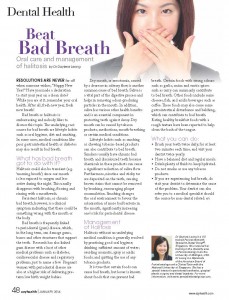 This article first appeared in the January 2014 issue of Ezyhealth magazine. We have reproduced it for the information of those of you who missed it when it was published.
This article first appeared in the January 2014 issue of Ezyhealth magazine. We have reproduced it for the information of those of you who missed it when it was published.
Resolutions are never far off when someone wishes, “Happy New Year!” Have you made a declaration to start your year on a clean slate? While you are at it, remember your oral health. After all, fresh new year, fresh new breath!
Bad breath or halitosis is embarrassing and nobody likes to discuss this topic. The underlying root causes for bad breath are lifestyle habits such as oral hygiene, diet and smoking. In some cases medical conditions like poor gastrointestinal health or diabetes may also result in bad breath.
What Has Bad Breath Got To Do With It?
Halitosis could also be transient (e.g. ‘morning breath’) since our mouth is less exposed to oxygen and less active during the night. This usually disappears with brushing, flossing and rinsing with a mouthwash.
Persistent halitosis, or chronic bad breath, however, is a clinical symptom indicating that there could be something wrong with the mouth or the body.
Bad breath is frequently linked to periodontal (gum) disease, which, in the long term, can damage gums, bones and other structures that support the teeth. Research has also linked gum disease with a host of other medical problems such as diabetes, cardiovascular disease and respiratory problems, just to name a few. Pregnant women with periodontal disease are also at a higher risk of delivering pre-term low birth weight babies.
Dry mouth, or xerostomia, caused by a decrease in salivary flow, is another common cause of bad breath. Saliva is a vital part of the digestive process and helps in removing odor-producing particles in the mouth. In addition, saliva has various other health benefits and is an essential component in protecting teeth against decay. Dry mouth can be caused by tobacco products, medications, mouth-breathing or certain medical conditions.
Lifestyle habits such as smoking or chewing tobacco-based products can also contribute to bad breath. Smokers usually have chronic bad breath and discolored teeth because chemicals in these products can cause a significant reduction of saliva flow. Furthermore, nicotine and sticky tar are deposited on the teeth, causing brown stains that cannot be removed by brushing, encouraging plaque accumulation. Smoking changes the oral environment to favour the colonization of more bad bacteria in the mouth, significantly increasing one’s risk for periodontal disease.
Management of Halitosis
Halitosis without an underlying medical condition is generally resolved by practicing good oral hygiene, drinking sufficient water, avoiding aromatic, spicy or acidic foods and quitting the use of any tobacco products.
It is true that certain foods can cause bad breath, but lesser is known about foods that can prevent bad breath. Certain foods with strong odors such as garlic, onion and exotic spices such as curry can commonly contribute to bad breath. Other foods include some cheeses, fish, and acidic beverages such as coffee. These foods may also cause some gastrointestinal disturbance and belching, which can contribute to bad breath. Eating healthy breakfast foods with a rough texture have been reported to help clean the back of the tongue.
What you can do:
- Brush your teeth twice daily, for at least for two minutes each time and visit your dentist twice yearly
- Have a balanced diet and regular meals
- Drink plenty of fluids to keep hydrated
- Do not smoke or use any tobacco products
If you are experiencing bad breath, do visit your dentist to determine the cause of the problem. Your dentist can also refer you to a medical specialist should the source be non-dental related.

Dr Daylene Leong is a US trained Periodontist with Specialist Dental Group®, Singapore. She received her training in the specialty area of Periodontology from the University of Michigan, USA. Dr Leong is a Diplomate of the American Board of Periodontology and a Clinical Tutor with the National University of Singapore. She has a special interest in periodontal aesthetics, gingival plastic surgery and dental implants. For more information, visit www.specialistdentalgroup.com.





